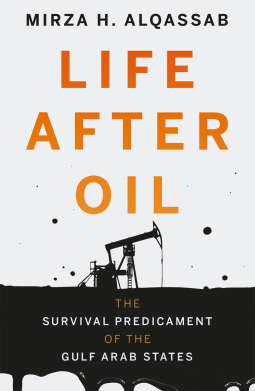
Life After Oil
The Survival Predicament of the Gulf Arab States
by Mirza H. Alqassab
This title was previously available on NetGalley and is now archived.
Send NetGalley books directly to your Kindle or Kindle app
1
To read on a Kindle or Kindle app, please add kindle@netgalley.com as an approved email address to receive files in your Amazon account. Click here for step-by-step instructions.
2
Also find your Kindle email address within your Amazon account, and enter it here.
Pub Date 22 Aug 2020 | Archive Date 6 Oct 2020
Troubador Publishing Ltd. | Matador
Talking about this book? Use #LifeAfterOil #NetGalley. More hashtag tips!
Description
The Gulf Arab states became rich by accident. Their golden ticket was oil, which has become the lifeblood of their social and economic systems. But they are prone to become a ‘vanishing Eden’, if the oil curse endures further and economic transformation remains a mirage.
LIFE AFTER OIL highlights the economic vulnerability of the Gulf states after the oil party ends. The region depends heavily on imports financed by petrodollars. So, when demand for oil sinks and prices plummet, or when oil and gas reserves ultimately vanish, their survival will be extremely challenged.
LIFE AFTER OIL raises the alarm to the impending survival challenges to face the burgeoning Gulf societies in the post-oil era, and tackles the ultimate question: what will the future look like?
A Note From the Publisher
Advance Praise
"This book will appeal to anyone with an academic or general interest with the Gulf Arab states and their oil wealth, how they accumulated it as well as what happens next. It should also appeal to people interested in the economies of the world and global economics and politics in general. The book asks a fundamental question that hasn't yet been asked elsewhere: what happens in the Gulf Arab states after the oil wealth runs out? The fact that nobody else seems brave enough to ask this question, at least not in this much detail, makes this book unique. It is written in a very accessible style, but with solid, factual foundations, which make it very readable, informative as well as thought-provoking." - Amazon review
Available Editions
| EDITION | Ebook |
| ISBN | 9781838596675 |
| PRICE | £8.99 (GBP) |
| PAGES | 200 |
Average rating from 7 members
Featured Reviews
This is a sobering book about how the Middle East with evolve (devolve?) when its oil stops flowing.
Anyone who is interested in the Middle East (or oil-rich countries such as Russia, Nigeria, Equatorial Guinea, and Venezuela) must read this book to understand the upcoming challenges.
The first few chapters review life before the oil boom (the Middle East was poor for the last couple of centuries).
It shows the diverse way that states spend their oil riches. Some do it responsibly, such as Norway. Some do it lavishly (Dubai). Others do it to control (Saudi Arabia).
The growing labor market and poor education mean that dark clouds are on the horizon.
The day of reckoning shall arrive in this century.
I like this quote: "What we think, or what we know, or what we believe is, in the end, of little consequence. The only consequence is what we do." - John Ruskin (1819-1900)
As an O&G journalist I was really interested to read this perspective on the Middle East and how it will be affected by oil inevitably becoming a thing of the past.
I found the book very well structured. Chapters were thoughtfully arranged and it was an easy read - something not many books on O&G can be accused of. I appreciated the level of depth the author went into on how the Middle East became so dominated by oil and exactly what will be affected by its inevitable decline. The case studies of other countries, Norway for example, was especially interesting as a comparison and the author's explanations were well reasoned and thoughtful.
A very worthwhile read.
Wow I was blown away by how incredible this book is! Not only is it impeccably researched, it is also a (completely not-boring) but compelling and enjoyable read.
I was interested in learning about what the future of the Gulf States would be, but this book also delves into the history and background of the region, as well as showing what other countries (Norway, Venezuela, some SE Asian nations) have done that have worked or not worked (some spectacularly so).
Each area including education, future energy sources, types of labor, environmental concerns, investments, and other things to understand to take care of future generations are presented in a thorough yet interesting way.
While he does not have a magic bullet for an answer to keeping the region wealthy once the oil runs out, he offers so many insights into what needs to be done. His charts and graphs at the end of the book are enlightening, but as he explains them all throughout the book, you do not feel the need to study every one of them in detail to understand what he is saying.
I am inspired to take many of these ideas and apply it to my own state of Alaska, which also has relied on oil, but must also make a leap into sustainable revenue for the future.
Thank you to NetGalley for an advance copy. This is one of my rare 5 star reviews.
Well structured, well researched, very informative and considered. This is a topic I'm forced to consider professionally and the issue is well flagged. The author has done a very good job in addressing the problems the Gulf Arab States face in replacing oil & gas income and what are currently the uses of oil proceeds, as well as indicating the existential issues the region as a whole is facing. Whilst Dubai has a head start in investing its commodity wealth into infrastructure and looking to draw alternative sources of income into the emirate, it is clear that the region as a whole will not be able to profit in a similar fashion as simply duplicating this process does not seem viable for the region as a whole.
The solution is in overcoming the political resistance to transform both the economies as well as the distribution of oil income, in a timely fashion. As always the path towards this goal is thoroughly unclear. The success of the author's proposal for a successful transition, by turning the issue to the people rather than the current regime, remains in doubt, especially when oil income represents such an important proportion of today's income. Nonetheless, there are several countries across the planet that rely to a significant degree on income derived from the exploitation of commodities that have gotten it right. And several that have gotten it disastrously wrong.
The solution remains elusive, although the author hints upon the similarities between those countries that "got it right". Living in the Netherlands, I'm well aware of the resource curse that this country faced and in contrast to Norway, gas revenues were neither invested in a sovereign wealth fund nor re-invested in long term infrastructure. The additional income was included in the government budget, arguably doing the same as is currently occurring in the Middle East, namely acting as a political pacifier. The good news was that this income by no means contributed to such a degree of government spending as seen in the Gulf Arab States.
In the end, there does not seem to be an obvious solution and I think the discussed issue ultimately transcends both oil and polity. A slow drawn out decline is usually insufficient to jolt a government into changing its ways. We will see in the coming years how the story this book looks into unfolds, which choices mattered and which proved detrimental to the stability of the region.
A very instructive and enjoyable read.
Readers who liked this book also liked:
Jessica Collins; Lisa Melamed
Children's Fiction, Español, Parenting, Families, Relationships






